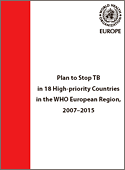Plan to Stop TB in 18 High-priority Countries in the WHO European Region, 2007–2015

Download
2007, viii + 53 pages
ISBN 978 92 890 7180 2
This publication is only available online.
Tuberculosis (TB) remains an important public health problem worldwide and in the WHO European Region. The high incidence of TB in many countries in the Region, the high level of multidrug-resistant TB, the appearance of extensive drug-resistant TB, the TB outbreaks in the growing pool of people living with HIV and the large population in prisons, and the increasing mobility of people, make TB a regional emergency that calls for effective Region-wide control. The Plan describes the main challenges, strategies and interventions to control TB in the 18 high-priority countries in the European Region: Armenia, Azerbaijan, Belarus, Bulgaria, Estonia, Georgia, Kazakhstan, Kyrgyzstan, Latvia, Lithuania, the Republic of Moldova, Romania, the Russian Federation, Tajikistan, Turkey, Turkmenistan, Ukraine and Uzbekistan. The Plan aims to reduce illness and death caused by TB, while contributing to poverty reduction, by:
- achieving, sustaining and exceeding the targets of 70% detection of sputum-smear positive cases and 85% treatment success rate; and
- ensuring universal access to high-quality care for all people with TB, especially the poor and marginalized.
The Plan is intended to be a guide for the high-priority countries to use in developing their own long- and short-term national plans on TB, and a reference for the WHO Regional Office for Europe and all other partners involved in fighting TB.



